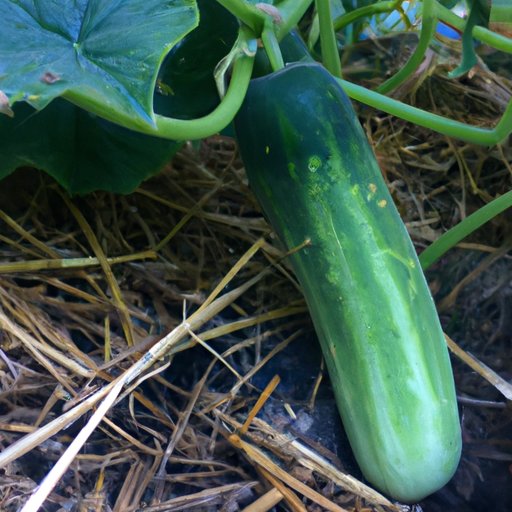Introduction
Are you tired of biting into a beautiful cucumber only to find that it’s bitter and unappetizing? Unfortunately, bitterness is a common problem among cucumber growers, and it can be caused by a variety of factors, from growing conditions to harvesting techniques. In this article, we’ll explore why cucumbers can be bitter, and what you can do to prevent it. We’ll discuss the science behind cucumber bitterness, common mistakes to avoid when growing cucumbers, and tips for achieving a sweeter, more delicious taste. Whether you’re a seasoned gardener or a novice grower, these insights and tips will help you create a more enjoyable and productive cucumber garden.
The Science Behind Cucumber Bitterness: Exploring the Causes and Solutions
The primary compound responsible for cucumber bitterness is cucurbitacin, which is a natural defense mechanism designed to protect the plant from predators. While some varieties of cucumbers are naturally more bitter than others, the level of bitterness can also vary within the same plant, depending on growing conditions and other factors. Fortunately, there are several ways to reduce cucurbitacin levels and improve the taste of your cucumbers. One simple solution is to remove the stem end of the cucumber, as this is where the highest concentration of cucurbitacin is found. Other solutions include selecting less bitter varieties of cucumber and growing them in optimal conditions.
Common Mistakes to Avoid When Growing Cucumbers to Prevent Bitterness
Over-fertilization, improper pruning, and temperature fluctuations are some common mistakes that can lead to bitter cucumbers. When cucumbers receive too much nitrogen, for example, they tend to produce more cucurbitacin. Similarly, if the plants are not properly pruned, they may put more energy into producing leaves and stems rather than fruit, resulting in a less sweet taste. Temperature fluctuations can also impact cucumber taste, as hot and dry conditions can cause the fruit to become more bitter. To avoid these mistakes, make sure to use proper fertilization techniques, prune your plants regularly, and keep them in a consistent environment.
From Soil to Plate: How Growing and Harvesting Techniques Affect Cucumber Taste
The quality of your soil, water, and harvesting techniques can all impact the flavor of your cucumbers. If your soil is too acidic or alkaline, for example, this can affect the nutrient uptake of your plants and ultimately result in a more bitter taste. Water quality is also important, as chlorine and other chemicals can impact the taste of your produce. When harvesting cucumbers, it’s important to pick them at the right time – if you wait too long, they may become overripe, resulting in a more bitter flavor. To ensure a better taste, consider using organic compost to enrich your soil, filtering your water, and harvesting your cucumbers at the appropriate time.
The Role of Temperature, Watering, and Sunlight in Cucumber Flavor
In addition to soil quality, watering, temperature, and sunlight are also important factors in cucumber flavor. Cucumbers prefer warm temperatures (around 70-85°F), and they need consistent watering to prevent wilting and bitterness. Overhead watering is generally preferred to avoid damaging the fruit, and it’s important to water consistently and deeply to promote healthy growth. Similarly, cucumbers require plenty of sunlight (at least 6-8 hours per day), which helps them produce more sugar and ultimately results in a sweeter taste. To optimize these factors, consider using shade cloth to protect your plants from excessive heat, investing in an irrigation system to provide consistent watering, and choosing a sunny spot in your garden for your cucumber plants.
Striving for Sweetness: Cucumber Flavor Enhancement Tips and Tricks
Companion planting, natural pest control techniques, and other strategies can also help improve cucumber flavor. Certain companion plants, such as marigolds and nasturtiums, can help repel pests that may be attracted to cucumbers, such as aphids and spider mites. Avoiding chemical pesticides can also improve taste, as these can leave residues on produce and impact its flavor. Other techniques, such as pinching off blossoms and focusing on root health, can also enhance the sweetness of cucumbers. By experimenting with different strategies, you can learn to create a more enjoyable and delicious cucumber crop.
Why Some Cucumber Varieties Tend to Be More Bitter Than Others – and How to Pick the Right Ones
Some cucumber varieties are naturally more bitter than others, due to genetic differences in their production of cucurbitacin. To avoid bitter cucumbers, look for varieties that are labeled as “burpless” or “seedless,” as these tend to be less bitter. Additionally, consider growing heirloom or other non-hybrid varieties, as these may have a more unique and flavorful taste. When selecting cucumber seeds or seedlings, look for those that are firm and healthy, with no signs of wilt or disease.
Cooking with Bitter Cucumbers: Creative Recipes to Hide the Bitterness
If you still end up with bitter cucumbers despite your best efforts, don’t despair – there are many creative ways to use them in the kitchen. For example, you can use thinly sliced cucumbers in salads and sandwiches, where their bitterness can be balanced out by other ingredients. You can also try pickling your cucumbers, as the vinegar and spices can mask the bitter taste. Other options include blending cucumbers into smoothies or using them as a base for chilled soups. With a little creativity, you can find ways to enjoy your cucumber crop even if they turn out to be a bit bitter.
Conclusion
In conclusion, bitter cucumbers are a common problem among growers, but they can be addressed with the right growing and harvesting techniques. By carefully controlling factors like soil quality, temperature, and sunlight, you can optimize your cucumber plants for a sweeter flavor. Additionally, by avoiding common mistakes like over-fertilization and improper pruning, you can help reduce the concentration of cucurbitacin in your cucumbers. Through experimentation and creative cooking techniques, you can turn even bitter cucumbers into a delicious and enjoyable addition to your meals.
